Founded and edited by Smaro Kamboureli
Published by NeWest Press: 1988-
Founded and edited by Smaro Kamboureli in 1988, and published by NeWest Press, this series features books by Canadian literary authors that reflect their critical thinking about their own writing and/or the writing of others.
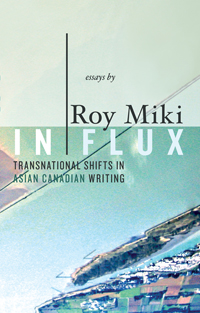
In Flux: Transnational Shifts in Asian Canadian Writing (Vol. XII)
- Written by Roy Miki
- 2011, 310 pp.
In this collection of essays edited by the University of Guelph’s Smaro Kamboureli, Roy Miki —poet, scholar, and member of the Order of Canada —investigates the shifting currents of citizenship, globalization, and cultural practices facing Asian Canadians today through the connections of place and identity that have been forged through our developing national literature.
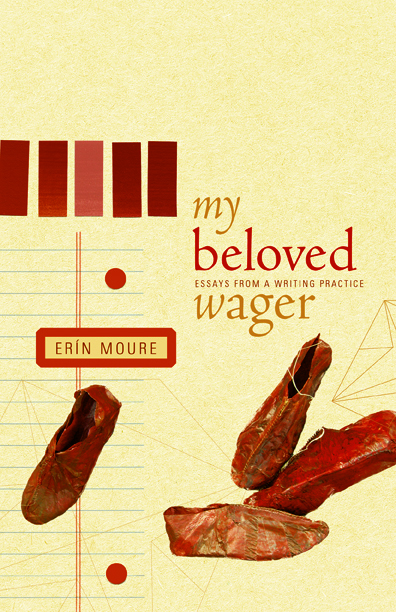
My Beloved Wager: Essays from a Writing Practice (Vol. XI)
- Written by Erin Mouré
- 2009, 352 pp.
Edited by Smaro Kamboureli, My Beloved Wager gathers essays by noted poet and translator Erín Moure, and records a quarter century of writing practice emerging from a city of exhilarating poetic and translatory possibility: Montreal. In her essays and linguistic-sculptural interventions on what poetry makes possible, Moure reveals why she has placed her bets on poetry as life. In these works, the richness of poetry is laid bare as Moure challenges us to think more deeply about who we are as speakers, readers, writers, and citizens of the world.
Moure was recently described as one of the 10 best English-language poets in Canada by the CBC’s Barbara Carey, who refers her as “one of our best — and most audacious — at expanding the possibilities of language.”
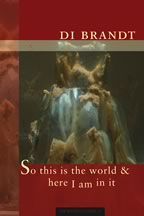
So This Is The World And Here I Am In It (Vol. X)
- Written by Di Brandt
- 2007, 256 pp.
So This Is The World And Here I Am In It is a stunning collection of creative essays by poet and critic Di Brandt. Written over a period of ten years, these essays circle around questions of exile and violence, eros and wildness, land and mentoring, home and language. They are experimental engagements with a lively array of personal and cultural memories, of places ranging from Winnipeg and Windsor to Berlin, Germany, of joyfully unruly characters in Canadian fiction, of the esoteric lives of Mennonites, honeybees, and twins.
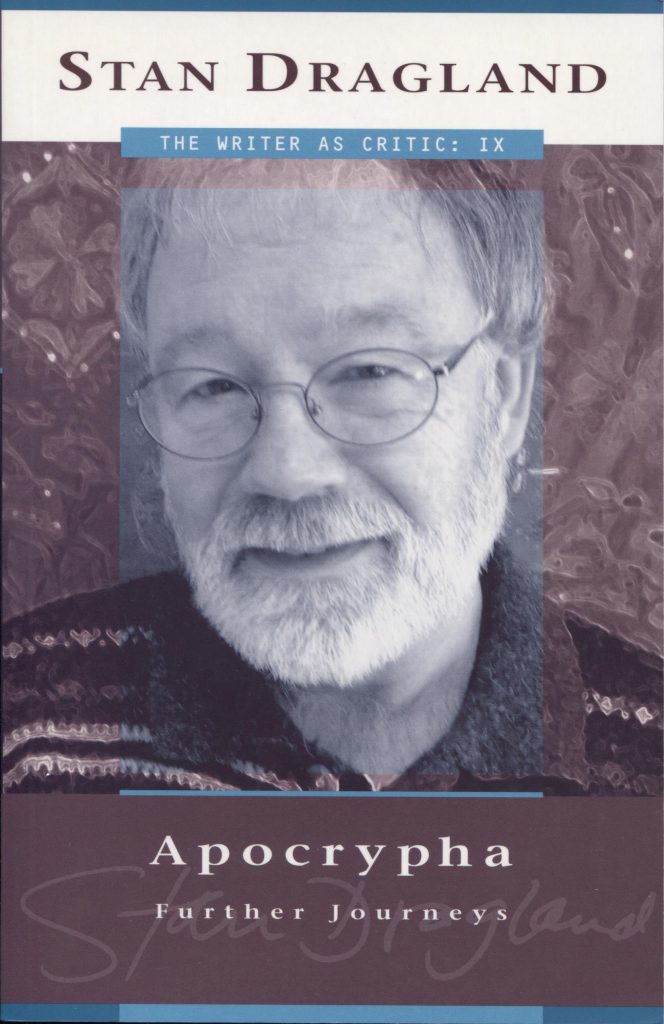
Apocrypha (Vol. IX)
- Written by Stan Dragland
- 2003, 272 pp.
A passionate meditation on the meeting of life and literature, and a text of rumination, invention, and rhapsody, Apocrypha celebrates tradition while going its own way, crossing genres and at times stretching out the sentence. Throughout the book, Dragland explores literary criticism that is personal in response, connecting with a thread of life-writing falling on many subjects, including learning and teaching, reading and writing. Dragland looks at the texts of strangers and colleagues, including Michael Ondaatje, Roy Kiyooka, Robert Kroetsch, Fred Wah, Matt Cohen, Agnes Walsh, and others, weaving together personal reminiscences with theoretical and critical looks at their work. Apocrypha is also touched with the landscapes of Dragland’s own life—from Alberta to Ontario to Newfoundland, and his travels through India, Germany, and England.
“‘Reading was my darling pleasure,’ Stan Dragland quotes from Bobbie Louise Hawkins, as an epigraph. It clearly was. And in this intimate—yes, intimate—journey through the highways and byways of Stan Dragland’s mind, he makes it our darling pleasure, too. The image of the house he drew as a child provides an insight into his particular focus. Viewed not from the front, as most children draw, but from catty corner, his drawing contained the inevitable sun, the front of the house, and that little bit more that is usually hidden: a view of the side. So it is with his writing. The inevitable sun, the front of the house and that little bit more—a view of the side.” (P.K. Page)
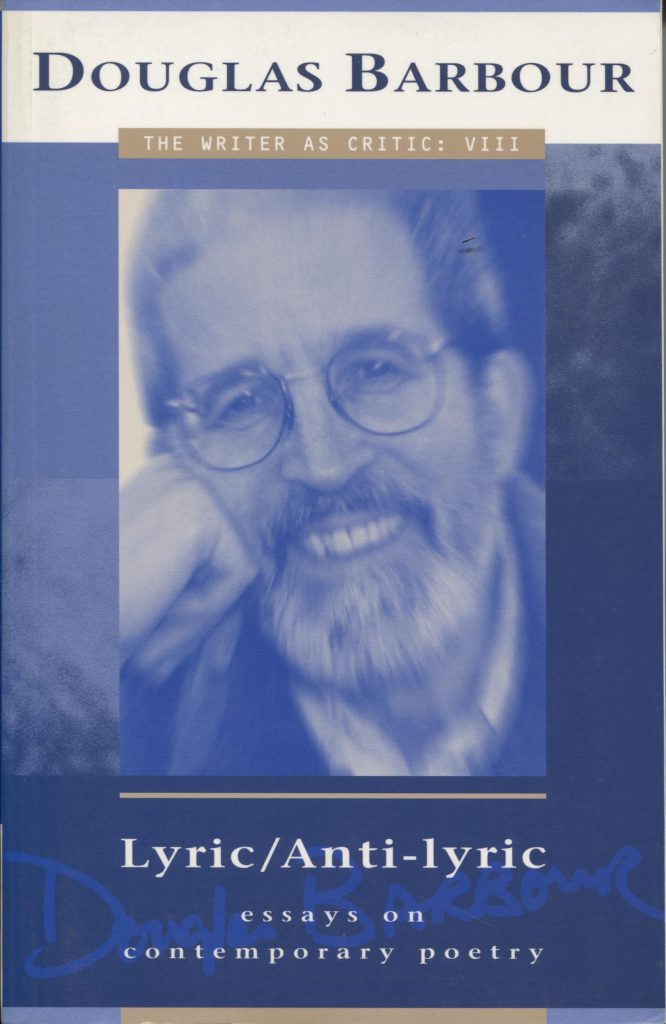
My Beloved Wager: Essays from a Writing Practice (Vol. VIII)
- Written by Douglas Barbour
- 2001, 288 pp.
“This accessible collection of essays represents twenty years of Doug Barbour’s thinking about modern and contemporary poetry. Barbour is a careful reader who attends to poetry’s nuances and responds with the subtlety of a scholar and the passion of a poet. ‘I tend to write essays as a series of notes,’ Barbour writes, ‘little travels over the body of single works, trying to see and hear what I can, and to articulate that response as responsibly as possible.’ His readers are fortunate indeed to join Barbour in his travels through a variety of works by Canadian, Australian and New Zealand poets.” Manina Jones
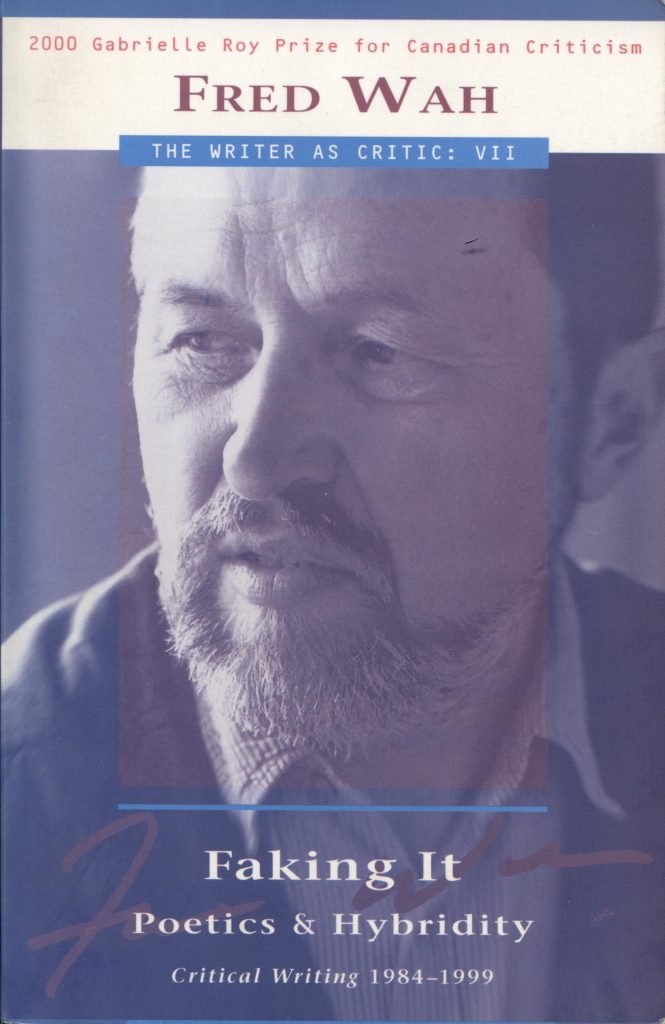
Faking It: Critical Writing 1984-1999 (Vol. VII)
- Written by Fred Wah
- 2000, 288 pp.
According to Fred Wah, the act of thinking critically is one of exploration and discovery. In Faking It, Wah demonstrates how writing poetry is writing critically. This scrapbook of Wah’s work— collected from fifteen years of his writing— contains essays, reviews, journals, notes and, most importantly, poetic improvisations on contemporary poetry and identity. Faking It was written between 1984 and 1999—during major shifts in critical thinking and cultural production—and the hybrid style of the book is an apt reflection of these changing times, as well as a reflection and study of Wah’s own hybrid identity.
“When Fred Wah probes the difficult questions of contemporary writing, his thinking always resists the trap of the descriptive and always engages in cross-border forays that unravel the boundaries of social, cultural, and national regulations. From the localism of language he cites and sites what have been the central intensities of our time. Racialization, hybridity, ethnicity, and writing—these abstractions come alive in the movement of events and contexts that constitute the nuances of a history enacted. “Faking it,” Wah cuts across the field to expose us to new ways of recognizing where we have been – where we are. In this stunning series of essays thought is tangible, guaranteed never to lose its freshness. Faking It gives us the musing at the heart of a critical poetics.” (Roy Miki)
“Fred Wah cracks open the verbal yolk of his poetic for us to read how writing writes. A trans-informing poetic evolved at that juncture where Wah’s postcolonial politic energizes poetry’s molecular attention to language, Faking It is provocative, affectionate, investigative. And necessary reading for any writing seriously engaged with the contemporary.” (Daphne Marlatt)
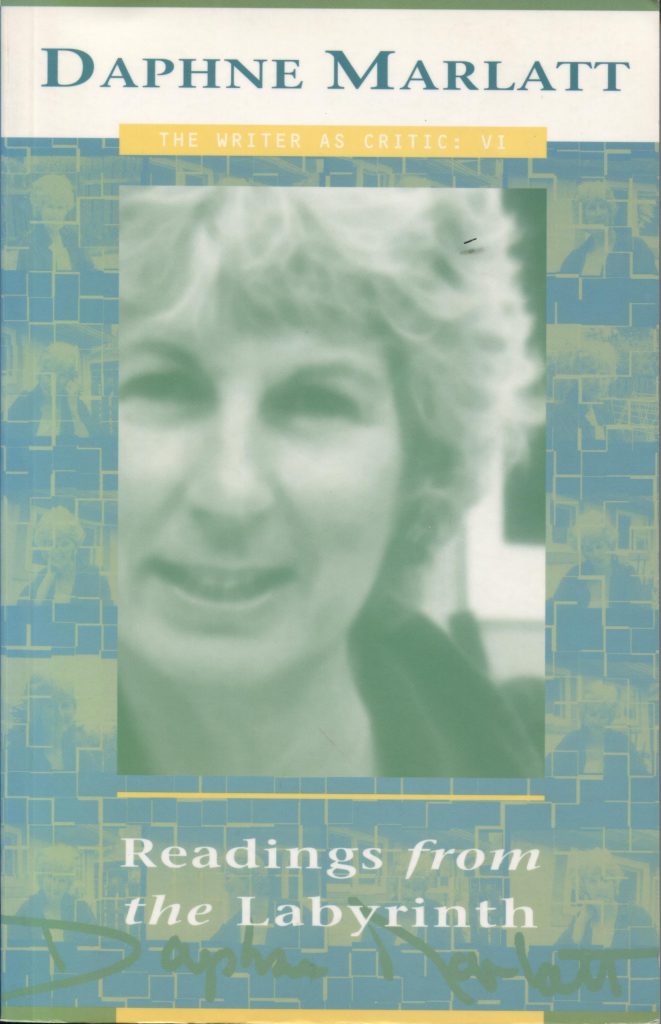
Readings from the Labyrinth (Vol. VI)
- Written by Daphne Marlatt
- 1998, 248 pp.
From one of Canada’s foremost poet/novelists and feminist critics – a collection of essays spanning over fifteen years.
“The collection of well-known and new essays by one of Canada’s most influential and most loved feminist writers is destined to become an instant classic. A generous, eloquent text, filled with allusions to other women’s words and rich aphorisms that, once heard, keep resonating; “a luminosity of being we participate in.” (Di Brandt)
“Readings from the Labyrinth recounts Daphne Marlatt’s journey in search of her own language, “mediated,” she says, “by the inner ear,” a journey into the ever-expanding space of words…” (Mary Meigs)
“How to think right in the old bone (and out, into the open) without piling anything more on the ossuary of thought: this book’s first originality is to out the problem. It wants the old straight thinking line multiple-lithe, flexible. Thus all the lovely loose-ends of letters, journal entries, notes, pulling the shaped and (re)considered pieces back out of book and away into the continuing life, the lives, they came from. One of Daphne Marlatt’s own ‘threshold words,’ betweeners like ‘fictionalysis’ of ‘facticity,’ will have to be found to describe it. Here’s a beginning: Readings from the Labyrinth—immediating—is a verb.” (Stan Dragland)
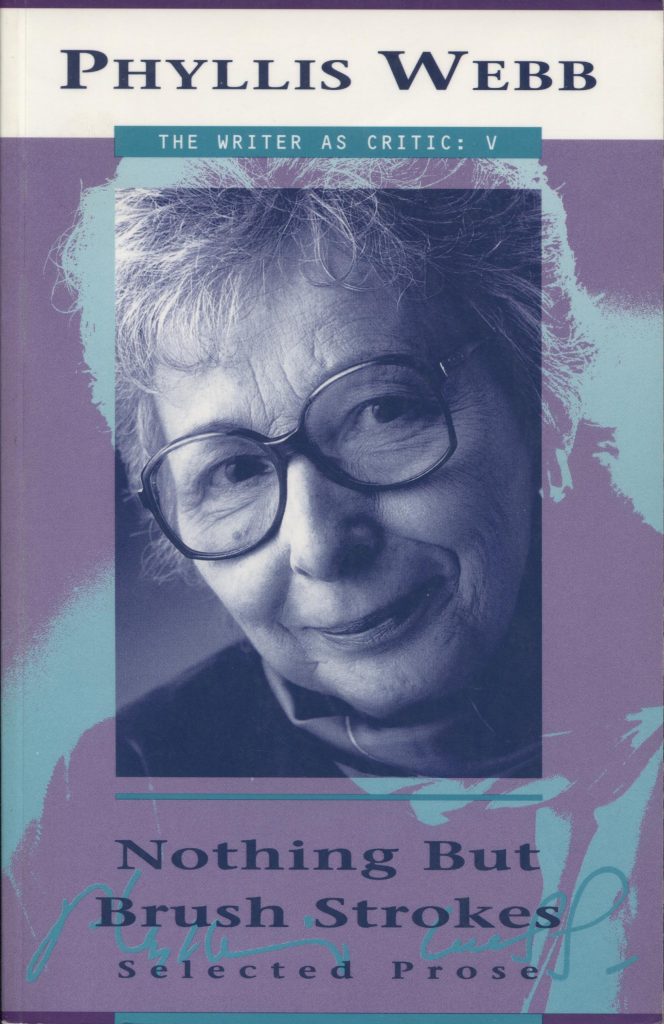
Nothing But Brush Strokes: Selected Prose (Vol. V)
- Written by Phyllis Webb
- 1995, 168 pp.
This collection chronicles Phyllis Webb’s struggle with the creative process and her intense need to probe beneath the surface of things.
“Yes, Phyllis Webb. Yes, yes, yes. And when our civilization burns out, as it must, this collection, along with some Mozart and a jar or two of yellow-box honey, should be placed in the time-capsule we leave behind.” (Georgia Savage)
“You don’t really read Phyllis Webb’s essays. You hear them. Webb is always interested in your presence, and she reaches toward you with her voice. Many of these pieces began as talks on or off the radio. The lovely, committed, playful voice of Phyllis Webb conjures your vocal response. Don’t be embarrassed if you find yourself talking out loud while you read.” (George Bowering)
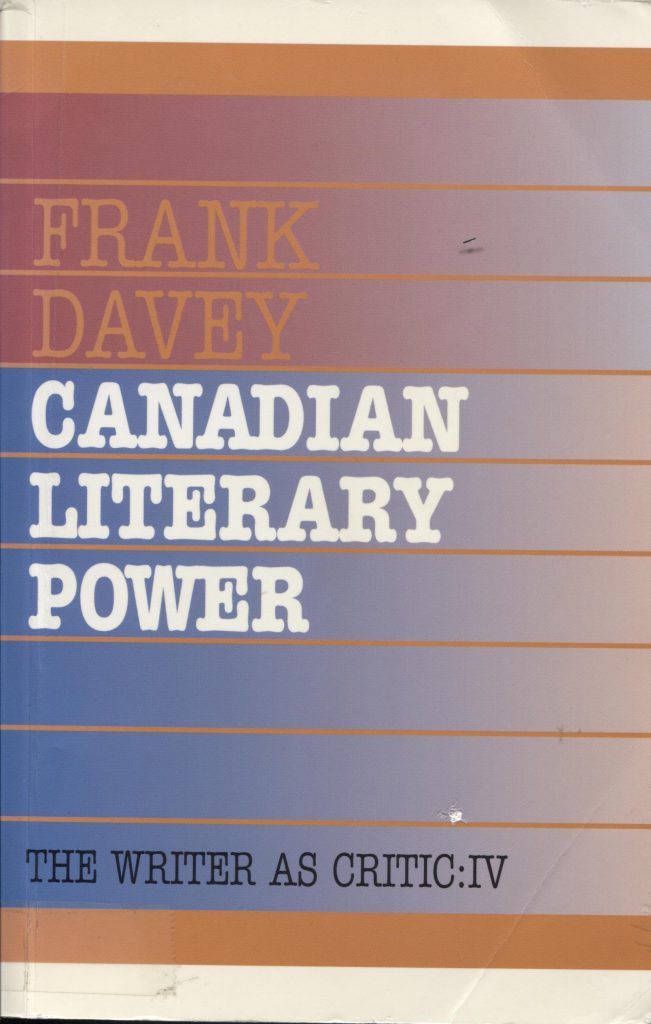
Canadian Literary Power (Vol. IV)
- Written by Frank Davey
- 1994, 317 pp.
“Frank Davey is the gadfly critic on the Canadian literary scene, and here he dares to sting the establishment figures where it hurts the most: he asks how much power the literary ‘powers’ really have. Davey, in these varied and challenging essays, makes possible new understandings of how literature enters into dialogue with politics, economics and the modes of cultural production in a society s difficult as the one we call Canada.” (Robert Kroetsch)
“It is becoming commonplace to refer to literary ‘institutions,’ the points where power lies, whether physical places such as universities and presses or idealogical repositories such as feminism and nationalism. However, very few significant critical minds apply themselves seriously to examining such institutions in Canada. Frank Davey does, and the provocative search through the powers that be and the powers that would be in Canadian literature. Many critics establish themselves and then stick to the groove. Davey certainly made himself known in 1974 with From There to Here but since then has often leapt from the expected path, changing and growing like no other critic of Canadian literature. In Canadian Literary Power he is still doing it.” (Terry Goldie)
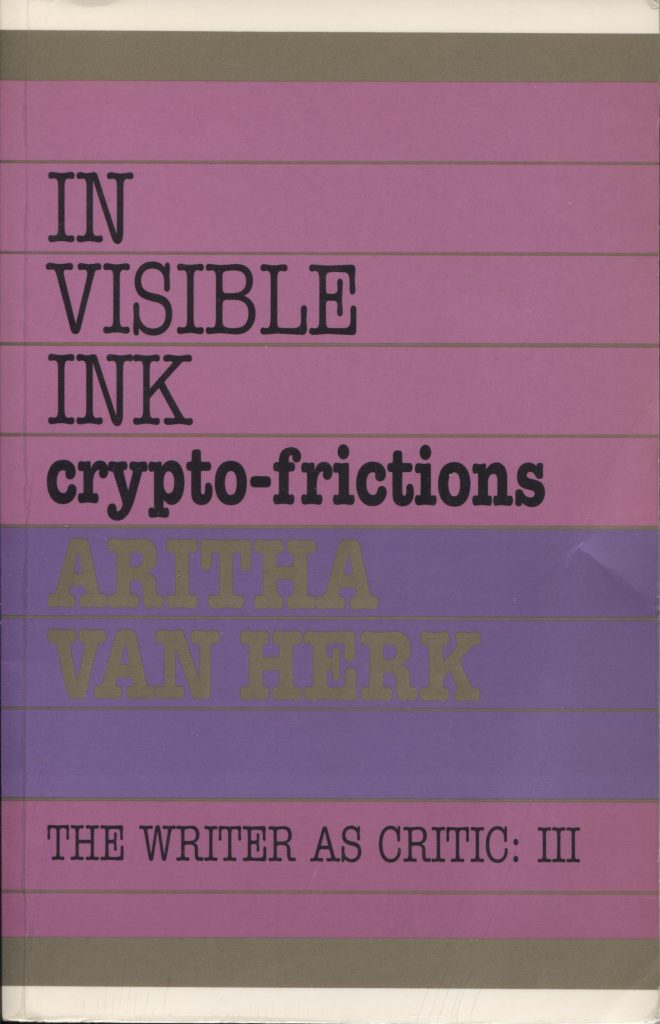
In Visible Ink: crypto-frictions (Vol. III)
- Written by Aritha Van Herk
- 1992, 218 pp.
In Visible Ink acknowledges that no form of writing can stay categorically separate from another. Both writing and reading, reader or writer friction each other, desire the contamination of words. As fiction writer and critic, Aritha van Herk explores other texts, other bodies, other moments arising from the otheredness of the writer in the uneasy position of critic. More than elucidations, these writings become journeys through language and imagination, weaving together the realms of fiction, autobiography, poetry, and criticism.
These pieces of In Visible Ink try to talk about writing and fail; try to talk about immigration and fail; try to read other writing and fail. But they succeed in re-writing, un-writing, and inventing another text, the text of crypto-friction.
“In Visible Ink explores the magic and the curse of literature and language in the face of life – life as a Canadian discovering the hereness of the Arctic, as immigrant daughter, as voracious and perspicacious reader, and especially as funny, gutsy and learned prairie feminist writer. As one essay puts it: ‘Readreadreadreadread.'” (Linda Hutcheon)
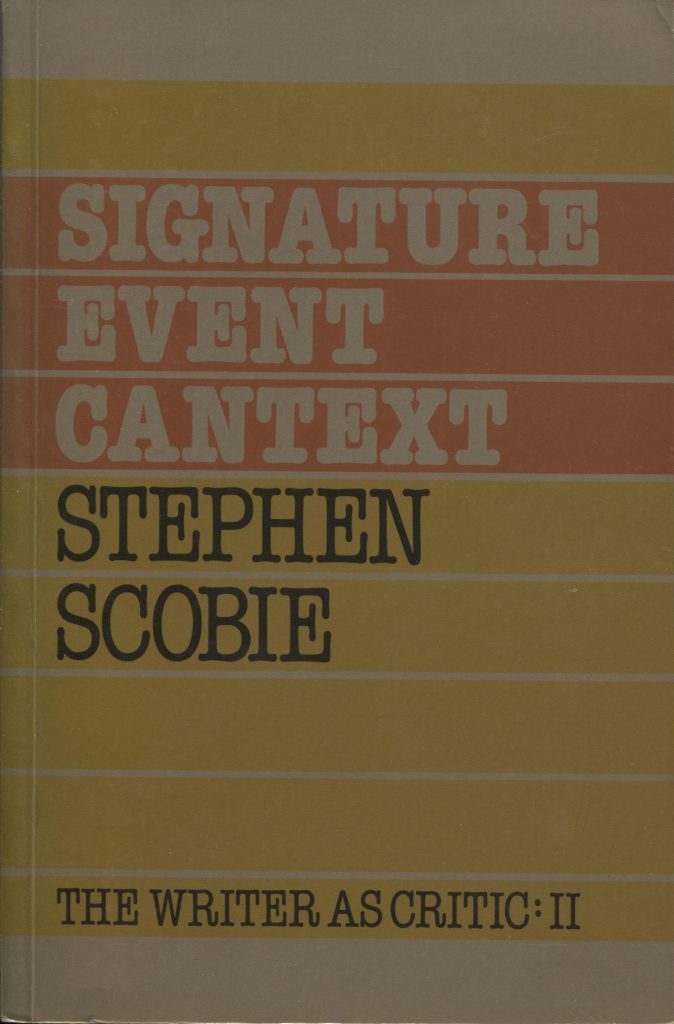
Signature Event Cantext (Vol. II)
- Written by Stephen Scobie
- 1989, 175 pp.
Signature Event Cantext is a collection of essays on Canadian writing, mostly contemporary, by such authors as Leonard Cohen, Phyllis Webb, and bpNichol. These authors are set within the context of the critical theory of Jacques Derrida, so the book also functions as an exposition of certain key terms in Derrida’s vocabulary: supplement, parergon, signature. These two elements are given equal weight: the Canadian authors are not there simply to serve as examples for Derrida’s theories, nor is Derrida merely a tool to explain the literature. Rather, the practical and theoretical aspects of the book work together, to reinforce each other, and thus to make an argument for the creative use of theory in contemporary criticism.
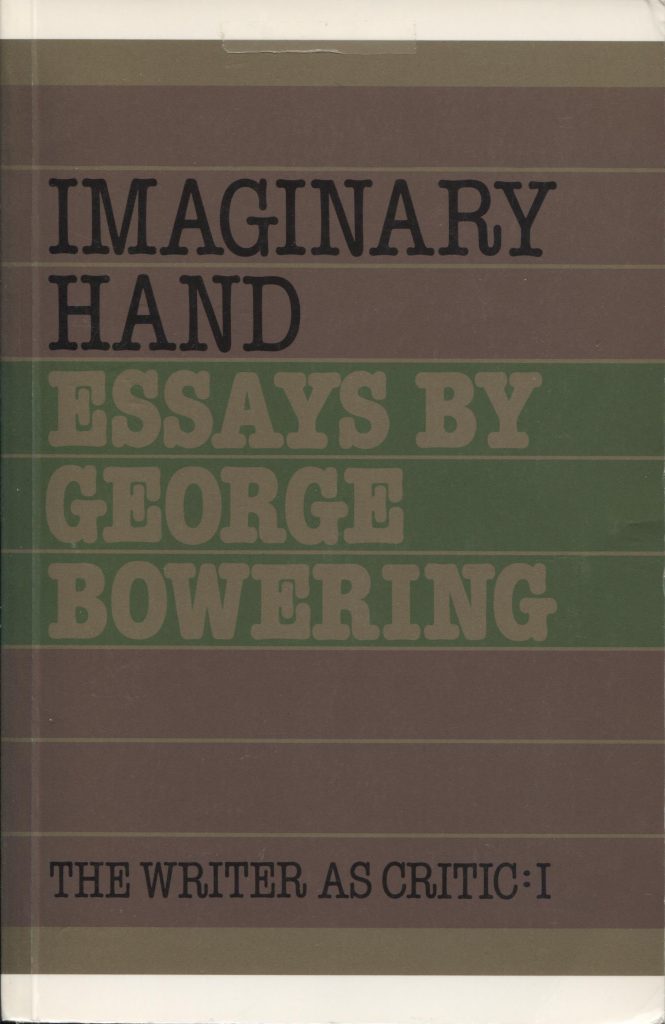
Imaginary Hand: Essays by George Bowering (Vol. I)
- Written by George Bowering
- 1988, 209 pp.
What would we do without George Bowering? Who else could give us both such tender, personal testimonies of the writer as (literal) amateur of books and language and also such acute theoretical and critical commentary on everything from religious poetry to baseball fiction? Who could better tease u with those wicked throw-away ironic lines: Beautiful Losers (1966) as the novel that “scandalized nineteenth-century Canada”; semantic criticism as “counting references to moose and snow”?
“This engaged and engaging book may come from the postmodern and geographical fringes but it is truly ‘written for all the other Canadians across the domestic darkness.'” (Linda Hutcheon)
“Exasperated with the apocryphal stores woven around TISH and the Black Mountain Influence, George Bowering wrote his own burlesque version in Craft Slices (1985): ‘The original Brown Mountain Poets (or at least the Vancouver ones) are now in positions of power at many Canadian universities. In every way we can try to mould the poetic minds of young writers, including those brought up in the snow belt.’ In typical Bowering manner, his flippancy only serves to disguise the committed, even stern, voice he assumes in his role as teacher and critic. As such, his chief tasks have been to establish an alternative canon to the works sanctioned by post-Centennial nationalist and thematic critics, to replace post-colonial influence with intercultural dialogue, and to make a special plea for avant-gardist women writers and critics.” (Eva-Marie Kröller)